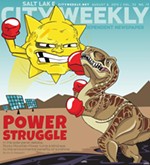Hauteur Theory
Federico Fellini once famously opined that “all art is autobiographical,” and he may have a point, but man … Tim Burton really needs to get over himself.
Over the course of a 20 year Hollywood career, Burton has carved out the kind of thematic territory for himself that gives auteur theorists tingly feelings in their special places. While he has almost exclusively adapted pre-existing material rather than creating his own stories, his protagonists have generally been eccentric outcasts and/or visionaries (Pee Wee’s Big Adventure, Edward Scissorhands, Ed Wood, Sleepy Hollow, Big Fish, even Batman), many of them dealing with absentee parent issues (Batman again, Edward Scissorhands, Big Fish). No wonder Burton seemed adrift when remaking Planet of the Apes a few years back; he didn’t know what to do when he couldn’t have Johnny Depp play a kook who needs his daddy.
That’s just what he’s got with his latest remake, Charlie and the Chocolate Factory, and you don’t have to revere the 1971 version of the story to feel like there’s something forced about Burton’s take on the tale. All of the most familiar elements are here: Willy Wonka (Depp) is still a legendary, reclusive chocolatier. He still hides five Golden Tickets in chocolate bars all over the world, allowing the five children who find them to tour his factory for a day. One of those children is still Charlie Bucket (Depp’s Finding Nevermore co-star Freddie Highmore), who lives in a ramshackle house with his parents and bed-sharing grandparents. There are still Oompa-Loompas (all of them played by actor Deep Roy), a river of chocolate and nasty, character-flaw-appropriate fates awaiting children who behave poorly.
Gene Wilder, however, is nowhere to be found. His more-than-faintly menacing Wonka has been replaced by Depp, teamed once again with Burton in a role where he’s determined to look and behave as strangely as possible. Yet he does find something uniquely demented in his pasty-faced, androgynous performance, reading lines in a Mister Rogers sing-song while behaving as comfortably with actual children as Krusty the Klown. He gets nearly all of screenwriter John August’s best lines, adding a distinctive physicality to the part of a guy with so few social skills he has to read from cue cards.
As for the factory itself, it’s not nearly the psychedelic freak-out offered up in Mel Stuart’s original film. You can always count on Burton for candy-colored production design, and this time he’s dealing with actual candy. The factory floor is liveliest when the Oompa-Loompas break into their cautionary tale production numbers, scored by frequent Burton collaborator Danny Elfman to everything from Bollywood shuffle to ELO-style retro-pop. With Burton on board, you can still count on a visual sensibility that’s a world of pure imagination.
But you can also count on that nagging urge to turn Willie Wonka into something virtually identical to his other protagonists. While the shift in the film’s title back to Dahl’s original might suggest a greater focus on the story’s young hero, ironically the opposite is true. Burton and August (who worked with Burton adapting Big Fish) concoct an elaborate back-story for Wonka, portraying him as the child of a stern dentist (Christopher Lee) who is forced to wear grotesque orthodonture. The film wrestles some clever gags out of the conceit--including Depp’s Wonka self-consciously commenting on experiencing flashbacks--yet ultimately the character loses some magic when he’s turned into just another therapy case.
And that’s a shame, because if there’s one thing Dahl’s stories should always be, it’s magical; even Burton understood that when overseeing the stop-motion James and the Giant Peach. This Charlie, though freaky and sometimes funny, feels too earthbound in its concern with characters’ psychology over pure morality play. There’s a degree of arrogance at work in Burton’s apparent inability to deal with his source material on it own terms. Sometimes, my man, it’s not all about you.
CHARLIE AND THE CHOCOLATE FACTORY
**1/2
Starring Johnny Depp, Freddie Highmore, David Kelly
Directed by Tim Burton
Rated PG



